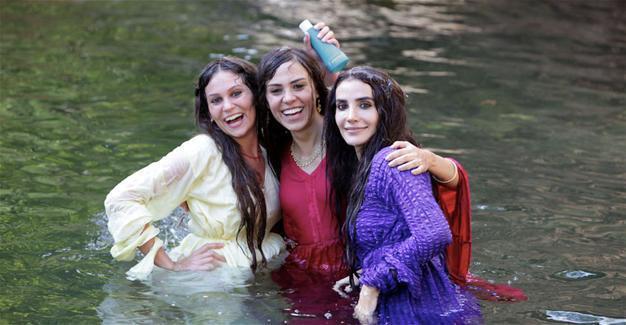‘Sour Apples’: Another notch in Yılmaz Erdoğan’s strong filmography
Emrah Güler

Despite being a prolific entertainer, Yılmaz Erdoğan finds time from acting and writing to sit in the director’s chair every three years. Last weekend saw a flurry of audiences run to theaters to watch the latest heart-warming tale in Erdoğan’s filmography, “Ekşi Elmalar” (Sour Apples), written and directed, as well as starring Erdoğan. The film follows a family over three decades from 1970s as they move around across Turkey.
Erdoğan became a household name in the mid-1990s with his hit TV series “Bir Demet Tiyatro” (A Bouquet of Theater), a comedy show on the mishaps of a middle-class family. A poet long before a career in film and TV, Erdoğan would go on to write the series, and star as the unforgettable character Mükremin Çıtır. “Bir Demet Tiyatro” would run for seven seasons between 1995 and 2002, and run an eighth and final season five years later.
Erdoğan’s craft in writing a TV series that would keep its edge and caliber for seven years was, in fact, shaped by a decade in theater, having joined acclaimed playwright, stage actor and director Ferhan Şensoy’s troupe “Nöbetçi Tiyatro” (On Duty Theater Staff) in 1987. At around the same time, he became the chief screenwriter for “Olacak O Kadar” (So It will Be), the long-running television sketch show of another renowned stage actor and comedian, Levent Kırca.
Soon Erdoğan founded his own theater company, “Güldüşündürü,” in 1988, and produced “Kanuni Sultan Süleyman ve Rambo” (Suleiman the Magnificent and Rambo), written by and starring Erdoğan, bringing him recognition among theater-goers. And in 1994, he founded the Beşiktaş Kültür Merkezi (Beşiktaş Cultural Center), a powerhouse for film and TV production to date.
In 2001, Erdoğan tried his craft in a new arena, the cinema, with his Midas touch bringing box office and critical success with his debut feature “Vizontele” (Visiontele). Written by Erdoğan, and co-directed with Ömer Faruk Sorak, the story is based on Erdoğan’s childhood memories in the late 1970s of the first television in his village in the southeast.
Erdoğan would carry his trademark comedy in “Bir Demet Tiyatro,” along with his successful co-star in the TV series, Demet Akbağ, and win three Golden Orange awards for best actor, best actress and best music. A sequel would follow three years later, “Vizontele Tuuba,” based once again on Erdoğan’s childhood memories and bringing together most of the cast from the original film.
[HH] Steering toward period drama
One year later, Erdoğan would put his signature on another box office and critical success, once again directing, writing and starring in the film. In “Organize İşler” (Magic Carpet Ride), Erdoğan played a small-time criminal, accidentally recruiting a comedy Superman impersonator into his gang. The film would also cement Erdoğan’s theater company as a sought-after, money-generating production company.
In his next feature film in 2009, “Neşeli Hayat” (Jolly Life), Erdoğan would stray from the comedy that he had come to be associated with, and play an everyday man taking the odd job of dressing as Santa Claus in a toys shop in one of Istanbul’s ever-increasing shopping malls. Turkey’s first Christmas movie saw Erdoğan shout an awkward “Ho, ho, ho!”
Four years later, Erdoğan would once again return to period drama, this time going further back to the 1940s. “Kelebeğin Rüyası” (The Butterfly’s Dream) followed two close friends, two poets, as they drift away from each other and starred the heartthrob Kıvanç Tatlıtuğ and Mert Fırat. The film was selected as Turkey’s entry for Best Foreign Language Film at the 86th Academy Awards.
In 2014, Erdoğan, along with another popular and prolific entertainer, Cem Yılmaz, starred in Russell Crowe’s directorial debut, “The Water Diviner,” a historical war drama. The film followed Crowe’s Australian farmer traveling to Turkey after the war in search of his three missing sons, bringing Erdoğan the Best Supporting Actor award at the Australian Academy of Cinema and Television Arts Awards.
In his latest “Ekşi Elmalar,” Erdoğan goes back to the period and setting of his first movie, “Vizontele,” the southeast Turkey in 1970s. Erdoğan stars as Hakkari mayor, a man hard to love but easier to empathize with. The film follows Erdoğan’s Aziz Reis, along with his three daughters, to the 1990s in the coastal city of Antalya. Acting, along with the cinematography and set and costume design turn the film into another entry in Erdoğan’s successful filmography.
 Despite being a prolific entertainer, Yılmaz Erdoğan finds time from acting and writing to sit in the director’s chair every three years. Last weekend saw a flurry of audiences run to theaters to watch the latest heart-warming tale in Erdoğan’s filmography, “Ekşi Elmalar” (Sour Apples), written and directed, as well as starring Erdoğan. The film follows a family over three decades from 1970s as they move around across Turkey.
Despite being a prolific entertainer, Yılmaz Erdoğan finds time from acting and writing to sit in the director’s chair every three years. Last weekend saw a flurry of audiences run to theaters to watch the latest heart-warming tale in Erdoğan’s filmography, “Ekşi Elmalar” (Sour Apples), written and directed, as well as starring Erdoğan. The film follows a family over three decades from 1970s as they move around across Turkey.